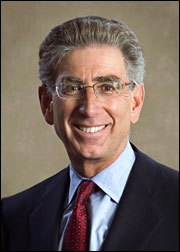
Phil Angelides gained national prominence in 2006 as he went head-to-head with Republican Gov. Arnold Schwarzenegger over who could be the greenest of them all.
His bid for the governorship may have failed, but he definitely made an environmental mark on the state as treasurer from 1999 to 2007. In that role, Angelides launched the Green Wave initiative, through which the state’s two largest public pension funds committed to invest $1.5 billion in clean energy and environmentally responsible companies.
He’s also been a strong proponent of smart growth, and the work of his development firm, River West, is best known for the Laguna West development in Elk Grove, Calif., that was one of the first guided by “New Urbanism” principles. The Congress for the New Urbanism gave Angelides its lifetime achievement award in 2005.
In the past few years, he’s turned his attention to the nexus of environmental work and the labor movement, and took over as the chairman of Apollo Alliance in July 2007. The alliance, a coalition of business, environmental, labor, and community groups, aims to ignite a “clean energy revolution” similar to the Apollo space program of the 1960s.
Angelides delivered one of the keynote speeches at last week’s Good Jobs, Green Jobs conference. Afterwards, Grist talked to him about the economic stimulus plan, green jobs, and his future political ambitions.
Grist: How good of a job does the stimulus bill do in putting a down payment on this promise of green jobs?
Phil Angelides: It’s a very significant down payment, and particularly when you look at the distance we’ve traveled, it’s remarkable that we’re talking about the scale of investments in energy efficiency and green job training that we are. Having said that, I think we need to do more. The movement needs to be grateful for what we can get, but always be pushing for more each and every day. It is a start.
Grist: A year ago we were talking about green jobs as a concept, and now they are becoming a policy reality. What do you see as the challenges in making those jobs happen?
Angelides: There are many things that need to happen here. We’re going to need to scale up the American workforce. We’re going to need to do more than just get money to retrofit public buildings and to seed local energy programs. We’re going to need to undertake a major effort to retool the American manufacturing base, and that hasn’t started yet. We’re going to need to pass climate legislation because we’re going to need to write new rules for the economy so that renewable energy and clean technologies can compete with dirty old fossil fuels. So we have a big journey to go here.
Grist: One of the concerns you hear often is that green jobs are not necessarily union jobs or good jobs. And your group exists at that nexus between labor and the environmental movement. What needs to happen to ensure that these jobs are not just green, but they’re also sustainable in other ways?
Angelides: I think that a couple big things need to happen. One is that we need to make sure that where there are public funds available to seed these new industries, the jobs created are good-wage, family-supporting jobs. I don’t think it’s in America’s interest to create a whole wave of subsistence-wage jobs, where people work full time and still struggle to put a roof over their heads. So that’s one piece of it.
The second piece … I happen to think that measures like the Employee Free Choice Act are important, because they empower workers to organize. It’s going to be a long, hard road to restore America’s middle class. The collapse of the middle class, the creation of an economy of inequality didn’t happen by mistake. It happened by design — big tax cuts for the wealthy, the weakening of labor unions. If we want to go the other way, it’s going to take big steps across the board.
Grist: You’ve worked on some of the big climate and energy initiatives in California, AB 32, and other programs that seek to address environmental problems. How good have those initiatives been at creating new, green jobs?
Angelides: They’ve just scratched the surface in my estimation. There’s been some good progress, but to date more rhetoric than reality. Across the nation and in California, we need to take this to scale. We need to make sure the programs are really in place.
Grist: Apollo Alliance talks a lot about social justice concerns, about making sure people who have been traditionally disenfranchised are getting these jobs. What are the prospects for getting in place employment programs that address those concerns?
Angelides: Well, it will have to be a deliberate public policy effort. It needs to be a campaign across the board. It needs to be an ability you give to workers, to be empowered, but it also means there needs to be training programs in inner cities. It also means that inner-city schools have to be strengthened. It means we have to up the number of young people, particularly in urban areas, that have good math and science teachers. There’s no silver bullet here. It has to be a mindset that we’re going to focus a lot more effort in this country on giving people a change to climb the ladder of opportunity. That ladder has been pulled up, and now it’s got to be pulled back down.
Grist: Any plans to run for governor again?
Angelides: Not today.

